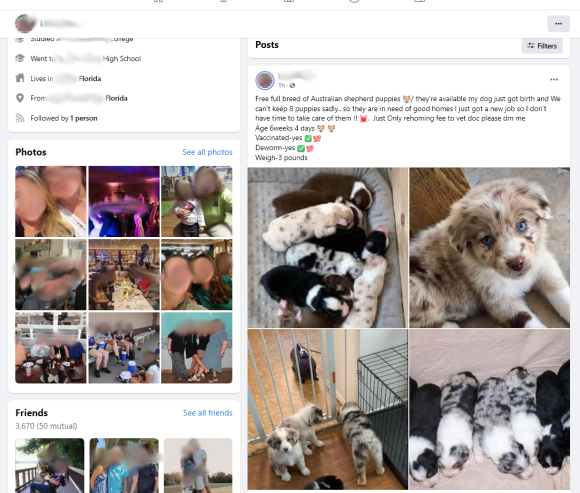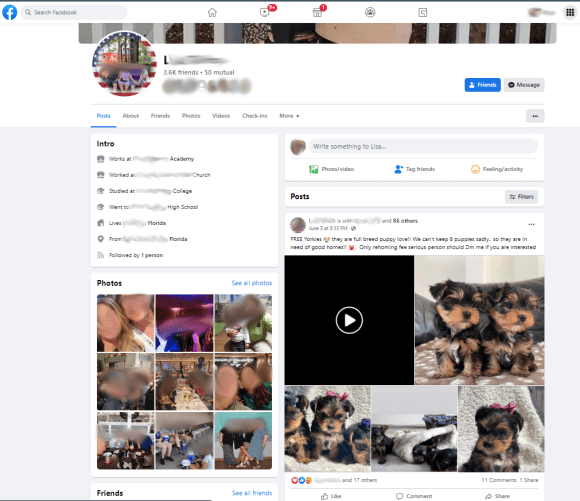I was tired and ready to relax at home after a fun, but long day out with the family. As we rounded the corner onto our street, I noticed a car parked across the street from my house. This was not completely unusual, but the way that they watched us, edged with excitement, was certainly odd. As we pulled into our driveway, I was surprised to see them get out of the car and start walking toward me, obviously unhappy about something. Before I knew what was happening, I was being confronted about a puppy the people claimed to have bought from me. It seems they had been sitting outside my house for over three hours waiting to pick up the puppy after sending me several hundred dollars through Cash App. The problem is, I never had any puppies to sell, and nobody sent me money through Cash App.
This might have been the first time people came to my house expecting to pick up an item they paid hundreds of dollars for, but it would not be the last. From puppies to PlayStation 5s, this scenario has played out over and over again.
Seems like this is farfetched? Unfortunately, it is not. This scenario happened to a friend of mine, and we have been unable to stop it from happening, over and over again. Not only is it a bad situation for the people being scammed, but dangerous for the person whose house they show up at.

How did this happen? This friend’s Facebook account, let’s call them ‘L’ for short, was stolen by scammers, but not in a way you may expect. You see, it seems these cybercriminals used a stolen copy of L’s drivers license, or a stolen photo of it, to get Facebook to hand over the account to them. Even though L is aware and has reported the account theft and subsequent fraud being committed in her name, Facebook will not take the account down or return her rightful access to it. Even with dozens of others reporting this is a stolen account, Facebook leaves it up to steal thousands of dollars from people, while putting L in real physical jeopardy from people who think she is stealing from them. L has a lot of friends and acquaintances, well over 3,000 friends on her Facebook account, has worked in a local church for a long time and is well known for being a wonderful person. These scammers hit the jackpot when they stole her account. This is not a lookalike account either. They have actually stolen her account, making things much more dangerous.

So, how do they get away with this? They are very sly and know how to game the system. I have personally seen posts on her page for the ‘free’ puppies (with a rehoming fee of course, which is where the money comes from) and for PS5s that they bought but cannot keep. They randomly tag a large number of people in these posts, drawing their attention. In all of these past incidents, after scamming as many people as they can, the posts are taken down in a day or so, removing any trace of the previous activity, but pop up a few weeks later to begin the scam again. If anyone attempts to make a comment in the post warning about the scam, the scammers delete the comment and block the person. Because this person is well known, she is tagged in quite a few posts from other people, making it look like her timeline is remaining active. This has been ongoing for nearly six months.

When it comes to ripping off the buyers, they know what they are doing as well. Buyers are rushed into making a decision, worried that the puppies would be claimed by someone else. They are told to pay through Cash App, which is non-refundable or cancelable, and they have even offered the picture of L’s drivers license as proof that it really is her. The scammers will offer to hold a puppy for a deposit via Cash App, asking for the balance in cash later, because they know that stealing some money is better than none, and it helps build trust with the victim. Keep in mind that these deposits are still hundreds of dollars.


Reporting the post has no impact at all, nor does reporting the profile, even after dozens or maybe even hundreds of reports. Facebook has been no help through their automated systems, even though there is an active police report filed with the county Sheriff’s Office. Talking to a person about it is impossible.
The Facebook method of dealing with accounts that have been stolen, is to ask for proof of account ownership by uploading a copy of your identification. This is where the scammers likely supply the image of the drivers license, and Facebook ignores dozens of people who have been scammed or are trying to help stop these criminals. How did they get the image of the drivers license? Odds are it was from one of the many data breaches that occur each week, or it was found after being lost somewhere (although L has not lost the physical copy of her license). Perhaps someone used personal information to get a duplicate, but it is unknown at this point.
Facebook is not the only thing impacted. L has also had to make sure other areas of her identity are locked down, including her credit reports and other areas of her life. Her Instagram account has also been taken over, but worst of all is wondering if the next person there to pick up their puppy after losing hundreds of dollars, is going to become violent.

If you think attacks like this on social media accounts are rare, I have bad news for you. Cybercriminals and scammers know the value of an account, and work hard to take them over. Just recently, a cybercriminal took over one million Facebook accounts in just four months (https://www.techrepublic.com/article/a-cybercriminal-stole-1-million-facebook-account-credentials-over-4-months/), mostly by tricking people into entering their login information in a fake webpage claiming to be from Facebook. Once they took over an account, they would send links to people in that account’s friends list, making the work very easy.
So, how can you protect yourself from being a victim of something like this? It pays to understand the threats to social media accounts.
A major threat is the reuse of passwords across different websites. When a breach occurs that leaks usernames and passwords, cybercriminals often use these credentials in something called a ‘credential stuffing’ attack. This means they try the same username and password in other places such as the major banks, shopping websites, email providers and yes, social media. If the username and password are used there, they will gain access to the account and will immediately change the password to their own. Then, they will change the recovery email address and phone number to ones they control as well, effectively locking you out of your account with no way to reset the new password.
A similar attack called ‘password spraying’ occurs when a cybercriminal takes an email address or username and tries it along with the most commonly used passwords, such as ‘12345678’ or ‘qwerty’, etc. There are lists of the most common passwords posted every year and they do not change very much. Just like in the above example, they then change passwords and contact information and essentially own the account.
In these two cases, having strong, unique passwords can make all the difference between keeping your account or losing it. To help manage these unique passwords, look into password managers, which are usually free or low-cost tools that help generate and protect passwords for you.
Multi-Factor Authentication (MFA) is another great way to help secure accounts. While it adds another step to the login process, it really helps stop cybercriminals who somehow guess or steal a password to an account. MFA is widely used in banking and is where you get a code via a text message, or type in a code that is generated in an application on your smartphone. This way, to log in, an account thief would need both your username, password and the code, making it much tougher.
Finally, any time a link takes you to a webpage that is asking for login information, be very careful. Make sure the URL of the login page is really from the website (facebook-login.com or login-facebook.com are NOT Facebook websites for example) and ask yourself if there really is a reason you would need to be logging into the account again.
Please understand the dangers of social media accounts and the potential nightmare they can become and protect your account just like you would your bank account. Not only can things get ugly online, but they can also become a physical threat, such as in the case with L.
Edit: They are back at it on July 01, 2022, just in time for the 4th of July holiday
Edit: there was another posting up as recent as July 11th, 2022, but it has been removed as of July 13th, 2022

